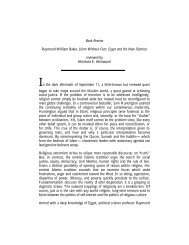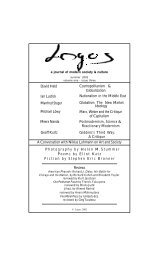Michael J. Thompson Stephen Eric Bronner Wadood Hamad - Logos
Michael J. Thompson Stephen Eric Bronner Wadood Hamad - Logos
Michael J. Thompson Stephen Eric Bronner Wadood Hamad - Logos
You also want an ePaper? Increase the reach of your titles
YUMPU automatically turns print PDFs into web optimized ePapers that Google loves.
<strong>Michael</strong> J. <strong>Thompson</strong><br />
prefer to keep their incomes safe from taxation and have little interest in an<br />
increase in social equality and do not see the deteriorating quality of their<br />
public services as being connected with dwindling tax revenues. Either way,<br />
this cleavage between the lower and middle classes is politically debilitating<br />
since the Democratic Party sees its traditional constituency of the working<br />
poor and middle class workers with divergent political interests even though<br />
they have more in common with each other than either of them do with the<br />
wealthy. The fact is that fighting for improved public services and worker<br />
protections of all kinds are things that both the working poor and the middle<br />
class share as common interests. The problem remains articulating a political<br />
message that bridges this divide.<br />
This reorientation of American democracy puts markets and private interest<br />
over that of the public interest. Indeed, this has been the mainstay of<br />
American public life, but the new phase of this trend threatens to make it a<br />
more permanent reality. The reality of this situation can be seen most<br />
explicitly in the rise in economic inequality in the United States. The income<br />
tax was started in 1914 as a “class tax,” one that took from the wealthy and<br />
redistributed to the rest of society. This turned into a “mass tax” during the<br />
Second World War to accrue monies for the war effort. However, it is<br />
precisely the notion of class that has been allowed to drop out of the<br />
discussion. Class is at the center of the tax cut debate because, as Barro<br />
incorrectly states, it is not the case that wealthy people are the ones that<br />
“produce” and therefore “earn” what they receive in terms of income.<br />
Capitalism is an economic system that produces profits from social labor; the<br />
fact that corporate CEOs make more than 400 times the income of the<br />
workers that actually produce the products and services can hardly be<br />
justified through an argument based along the lines of earning one’s pay.<br />
This may be an extreme example, but all one needs to do is look at any<br />
corporation that develops, say, new technologies. Most, if not all, new<br />
technologies are developed in labs and research departments by Ph.D.s or<br />
other highly-skilled researchers earning middle income salaries whereas<br />
owners earn profits and income that are exponentially higher.<br />
What this discussion points to is that the very meaning of democracy in<br />
America is being transformed, perhaps transmogrified is a better term. In<br />
place of public concerns and the public interest, it is private interest that has<br />
now become paramount in social policy. Whereas the general character of the<br />
American welfare state in the post-war period implicitly recognized that<br />
political democracy and political equality are practically meaningless without<br />
<strong>Logos</strong> 2.3 – Summer 2003




